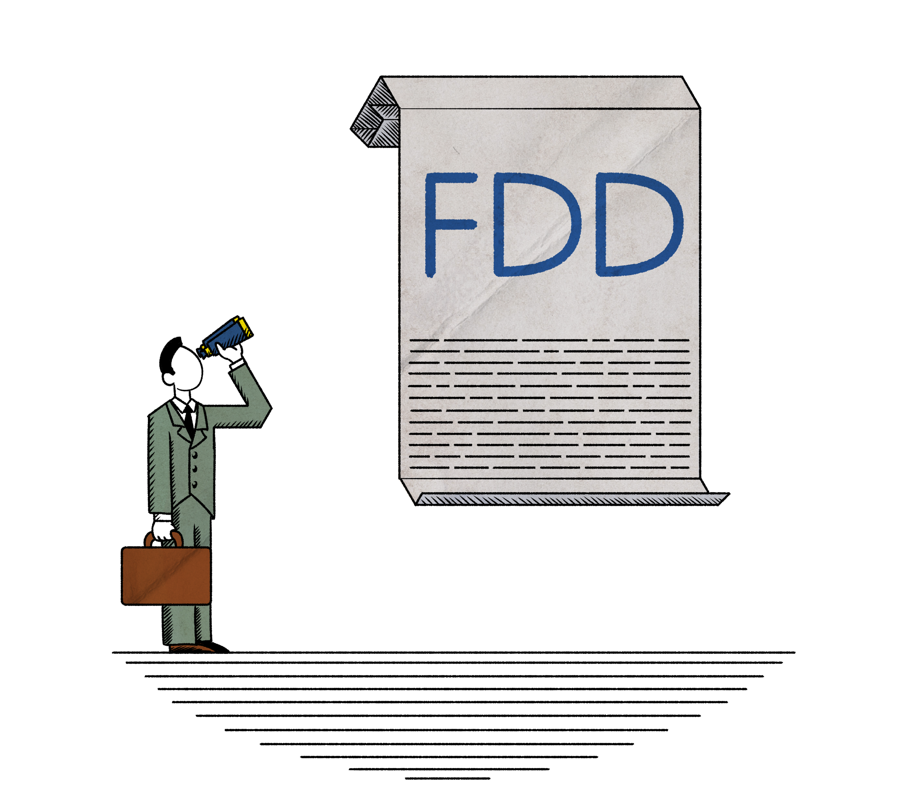Navigating the world of franchising can be both exhilarating and daunting for aspiring entrepreneurs. At the heart of this journey lies the Franchise Disclosure Document (FDD), an essential roadmap that contains crucial information. For potential franchisees, understanding the FDD is not merely a formality; it is a pivotal step in ensuring long-term success and safeguarding investments.
This complex document unveils vital details about the franchisor’s business model, financial health, and operational expectations. Yet, it can also feel overwhelming, filled with legal jargon and intricate clauses.
Grasping its significance might seem daunting at first, but doing so will empower franchisees to make informed decisions, mitigate risks, and lay a solid foundation for their franchise venture. While the excitement of owning a franchise beckons, the FDD serves as a critical guidepost in the journey ahead.
Introduction to the Franchise Disclosure Document (FDD)
:max_bytes(150000):strip_icc()/GettyImages-1088397822-d186bcf2c134434b8e239f264aee8b8d.jpg)
The Franchise Disclosure Document (FDD) stands as a vital cornerstone in the realm of franchising, serving as an exhaustive source of crucial information for prospective franchisees. This legally mandated document not only outlines the terms and conditions of the franchise agreement but also discloses important details about the franchisors financial performance, business history, and operational guidelines.
By carefully scrutinizing the FDD, potential franchisees gain insights that are essential for making informed decisions, mitigating risks, and ultimately determining whether a particular franchise opportunity aligns with their goals. In an industry replete with complexities and nuances, the FDD emerges as a beacon, illuminating the path towards a successful and sustainable franchise business.
What Is the FDD and Why Is It Mandatory?

The Franchise Disclosure Document (FDD) is a critical legal document that provides prospective franchisees with essential information about the franchise system, including the franchisors background, business model, fees, obligations, and potential risks. Mandated by the Federal Trade Commission (FTC) in the United States, the FDD ensures that potential franchisees can make informed decisions before entering a franchise agreement.
The complexity of the FDD lies in its detailed nature, encompassing everything from financial statements to litigation history, all of which require careful scrutiny. For a franchisee, this document is more than just a formality; it serves as a comprehensive guide to understanding the ins and outs of their potential investment.
Without the FDD, franchisees could be left in the dark about pivotal aspects of their future venture, possibly leading to costly mistakes. Ultimately, its not merely a regulatory requirement—its a vital tool that promotes transparency and protects the interests of those looking to join the franchise world.
Key Components of the FDD Every Franchisee Should Know
Navigating the world of franchising can feel like decoding a hidden language, and at the heart of this intricate system lies the Franchise Disclosure Document (FDD). Comprised of multiple essential components, the FDD is a comprehensive resource designed to arm prospective franchisees with vital information.
Key parts include the franchises financial performance representations, which give insight into anticipated earnings; the franchise fees and other costs that will impact profitability; and the details of the franchise agreement that will govern the franchisees obligations.
Moreover, the initial term and renewal options play a pivotal role in understanding the longevity of the franchise relationship. Each section, rich with information, not only clarifies expectations but also safeguards potential franchisees against unforeseen challenges. Delving into the nuances of the FDD can empower franchisees to make informed decisions, ensuring they are not only buying into a brand but also a secure and viable business opportunity.
Conclusion
In conclusion, the Franchise Disclosure Document serves as an essential tool for prospective franchisees, providing comprehensive insights into the franchises operations, financial performance, and legal obligations.
By thoroughly reviewing this document, franchisees can make informed decisions, mitigate risks, and set realistic expectations for their journey in the franchise world. Understanding the intricacies of the Franchise Disclosure Document can ultimately lead to better outcomes and a more successful franchise experience, underscoring its importance in the franchising process.


